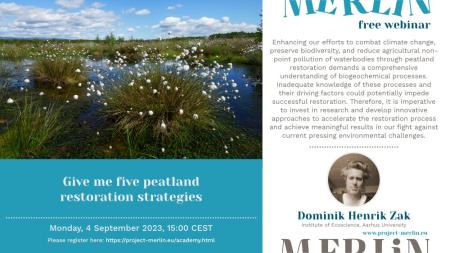
Merlin Academy:
Here we will build up the MERLIN Academy on freshwater ecosystem restoration and nature-based solutions including topics like innovative restoration techniques, fundraising, restoration governance and monitoring.
The MERLIN Academy will be an online learning place that can be accessed by its registered users any time and that allows interactive learning options and keep track of the learning progress while its completion. It will be open to any interested person and will be organised in three different curricula addressing
- administration and managers
- restoration practitioners
- the scientific community with focus on students
Technically, the courses of the MERLIN Academy will include live webinars, online training workshops, recorded e-learning sessions (webinars or presentations) accessible for users at any time. Content-wise this will include for example the presentation of best practice restoration projects, technical guidance, the development of regional scalability plans, large-scale upscaling strategies, Cost-Benefit-Analysis, interactive maps on benefits of restoration measures, community and sector involvement as well as institutional arrangement strategies.
Additionally, the MERLIN Academy will host a knowledge centre that will include short videos and animations, manuals and state-of-the-art guidance documents related to for example spatial configuration of restoration measures within a catchment, benefits of different restoration types on ecosystem services and biodiversity, design standards for certain nature-based solution restoration methods, synergies of nature-based solutions/restoration with various sectors, a governance framework for successful restoration as well as financing strategies for restoration on different spatial scales or sector-specific strategies for restoration synergies. The knowledge centre will be complimented by a glossary of terms and a library of recommended scientific reading (a glossary of freshwater terms is already available on the Freshwater Information Platform).
Webinar:
Enhancing our efforts to combat climate change, preserve biodiversity, and reduce agricultural non-point pollution of waterbodies through peatland restoration demands a comprehensive understanding of biogeochemical processes. Inadequate knowledge of these processes and their driving factors could potentially impede successful restoration or, at worst, lead to adverse outcomes like increased greenhouse gas emissions and nutrient swapping to downstream systems, both in the short and long term. Therefore, it is imperative to invest in research and develop innovative approaches to accelerate the restoration process and achieve meaningful results in our fight against these pressing environmental challenges.